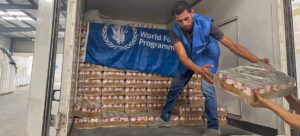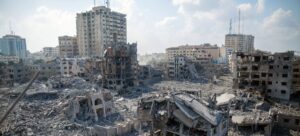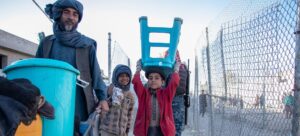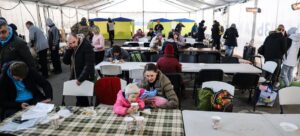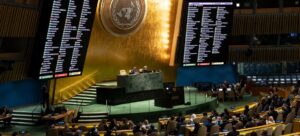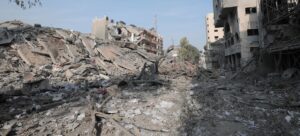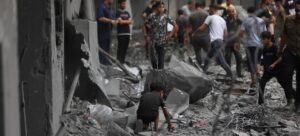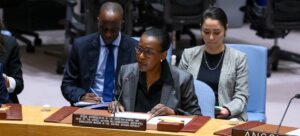The UN chief’s visit comes as the crisis in the Gaza Strip enters its third week following the 7 October incursion by Hamas militants into Israel and Israel’s subsequent declaration of war.
Late last week the UN adopted a resolution calling for a humanitarian truce, but the past few days have seen heavy bombardment and reports of ground operations inside Gaza by Israel.
“I know that even though the conflict in the Middle East is thousands of miles away, it has hit very close to home for the people of Nepal,” said the UN chief at a press conference on Sunday alongside Prime Minister Pushpa Kamal Dahal.
Also expressing best wishes for the safe return of Bipin Joshi, a Nepalese citizen who is missing, the Secretary-General vowed that he would continue to insist on the immediate and unconditional release of all the hostages in Gaza.
antonioguterres
“And I repeat my utter condemnation of the appalling attacks perpetrated by Hamas. There is no justification, ever, for the killing, injuring and abduction of civilians,” he stated.
At the same time, Mr. Guterres noted the extremely dire situation in Gaza and expressed regret that instead of a critically needed humanitarian pause supported by the international community, Israel has intensified its military operations.
“The number of civilians who have been killed and injured is totally unacceptable. All parties must respect their obligations under international humanitarian law … which emerged from the tragedy and awful experiences of war,” he continued.
Emphasizing his consistent calls for strict compliance with international humanitarian law, the Secretary-General stated: “The Laws of War establish clear rules to protect human life and respect humanitarian concerns. Those laws cannot be contorted for the sake of expedience.”
Mr. Guterres said that in Gaza more than two million people with nowhere safe to go, are being denied the essentials for life – food, water, shelter and medical care – while being subjected to relentless bombardment.
“I urge all those with responsibility to step back from the brink,” he said calling the situation a “humanitarian catastrophe.”
The Secretary- General reiterated his appeal for an immediate humanitarian ceasefire, the unconditional release of all hostages, and the delivery of a sustained humanitarian relief at a scale that meets the needs of the people of Gaza.
“We must join forces to end this nightmare for the people of Gaza, Israel and all those affected around the world, including here in Nepal,” he said.
Nepal’s commitment to multilateralism, SDGs
The Secretary- General praised the Himalayan country’s long tradition of championing peace and multilateralism and called on the world to “be a better friend to Nepal”, which is caught in raft of crises not of its own making, including the threat posed by climate chaos.
Mr. Guterres thanked Prime Minister Dahal and said that the UN was hugely grateful to Nepal for its support for multilateral solutions – backed up its enormous contribution to peacekeeping missions worldwide.
At the start of his four-day visit to the country, the UN chief also praised Nepal’s “astonishing progress” over the past two decades, as it had become a republic, established peace, and thrown itself behind the Sustainable Development Goals (SDGs) and climate action.

‘Graduation’ on the horizon
“And there’s more to come,” Mr. Guterres continued, explaining that “the next few years will be decisive, as Nepal prepares to graduate from Least Developed Country status.”
The Secretary-General was referring to the UN-facilitated process by which the world’s most vulnerable nations, once they meet a set of criteria (on income, human assets and economic and environmental vulnerability), may take phased steps towards ‘graduation’, which represents an important milestone in the development path of LDCs.
The UN chief went on to note that over the Next few years, Nepal would also embark on the final stages of the peace process: transitional justice.
“Transitional justice must help to bring peace to victims, families and communities,” he said, emphasizing that “the United Nations stands ready to support Nepal to develop a process that meets international standards, the Supreme Court’s rulings, and the needs of victims – and to put it into practice.”
‘Blizzard of global crises’
“Nepal is also caught in a blizzard of global crises not of its making: the aftermath of the COVID-19 pandemic, inflation, and the enormous threat posed by climate chaos,” said the Secretary-General.
As such, he said, much more international action is needed. Developed countries must step up to support sustainable development, and help developing economies including Nepal to tackle the climate crisis.
The UN chief noted that on this trip, he planned to visit the Himalayas to see first-hand the terrible impact of the climate crisis on the glaciers.
“The situation is dire, and it is accelerating. Nepal has lost close to a third of its ice in just over thirty years. And glaciers are melting at record rates,” he said, adding: “The impact on communities is devastating.”
With this in mind, Mr. Guterres said that he also planned to meet with local people in the Himalayas to hear directly from them about how they are affected.
He is also expected to travel to Pokhara and to Lumbini, to reflect on the Lord Buddha’s teachings of peace and non-violence.
“And I want to explore how the United Nations and Nepal can work together to solve problems, boost prospects, and improve international support. Because though Nepal is a friend to the world, the world must be a better friend to Nepal,” he concluded.

